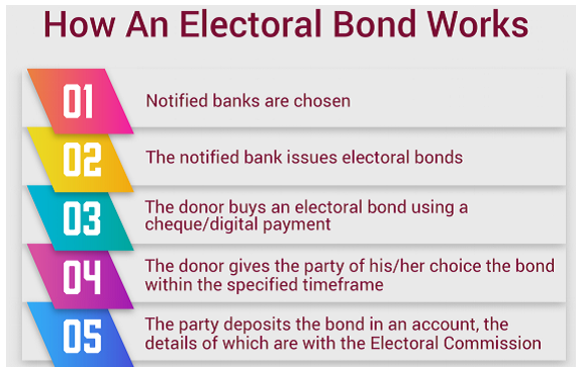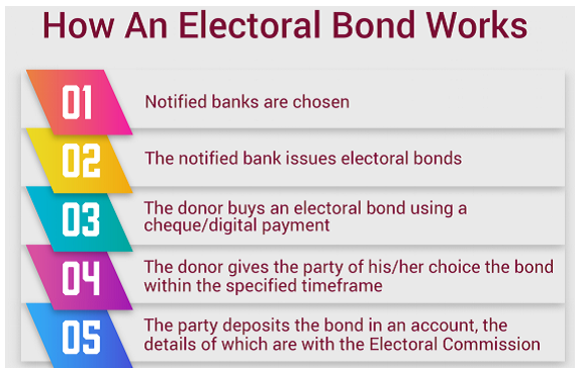- Courses
- GS Full Course 1 Year
- GS Full Course 2 Year
- GS Full Course 3 Year
- GS Full Course Till Selection
- Online Program
- GS Recorded Course
- NCERT (Recorded 500+ Hours)
- Polity Recorded Course
- Geography Recorded Course
- Economy Recorded Course
- AMAC Recorded Course
- Modern India, Post Independence & World History
- Environment Recoded Course
- Governance Recoded Course
- Science & Tech. Recoded Course
- International Relations and Internal Security Recorded Course
- Disaster Management Module Course
- Ethics Recoded Course
- Essay Recoded Course
- Current Affairs Recoded Course
- CSAT
- 5 LAYERED ARJUNA Mentorship
- Public Administration Optional
- ABOUT US
- OUR TOPPERS
- TEST SERIES
- FREE STUDY MATERIAL
- VIDEOS
- CONTACT US
ADR REPORT ON ELECTORAL BONDS
ADR REPORT ON ELECTORAL BONDS

Latest Context
Recently, the Association of Democratic Reforms (ADR) which is a Non-Governmental Organization (NGO) issued a report on the electoral bonds which is the main source of funding to the Political Parties in India.
Key Note: In the present scenario, seven national parties and 24 regional parties obtained a total donation of ₹9,188.35 crore through Electoral Bonds between 2016-17 and 2021-22. ADR which was established in 1999 analyzed donations received from anonymous Electoral Bonds, direct corporate donations, contributions from MPs/MLAs, meetings, morchas, and collection by party units.
Key Highlights of the ADR Report
-
Analysis of Donations and Funding Sources
- During the general elections (2019), the highest donations from Electoral Bonds, total ₹3,438.8237 crores, were received.
- During the year 2021-22 in which eleven Assembly elections were conducted, a donation worth ₹2,664.2725 crore through Electoral Bonds was received.
- Out of the total donations of ₹16,437.635 crore received by the 31 political parties analyzed, 55.90% came from Electoral Bonds, 28.07% from the corporate sector, and 16.03% from other sources.
-
National Parties
- During FY 2017-18 and FY 2021-22, National parties experienced a huge increase in donations from Electoral Bond, witnessing a 743% increase.
- During the same period, in contrast, corporate donations to national parties increased by only 48%.
- Regional Parties and Electoral Bond Contributions: Regional Parties also experienced a substantial proportion of their donations coming from Electoral Bonds.
-
Power-Biased Donations of Electoral Bonds
- Since the BJP is in power, it received the highest donation among national political parties. Over 52% of the BJP's total donations were sourced from Electoral Bonds, amounting to ₹5,271.9751 crore.
- The Congress received the second-highest Electoral Bond donations, with ₹952.2955 crore (61.54% of its total donations), followed by the Trinamool Congress with ₹767.8876 crore (93.27%).
Electoral Bonds 
- Introduction: In 2017, the electoral bonds system was introduced through Finance Bill and it was implemented in 2018. Electoral Bond act as a medium for individuals and entities to make donations to registered political parties while maintaining donor anonymity.
-
Features
- State Bank of India (SBI) issues the bonds in denominations of Rs 1,000, Rs 10,000, Rs 1 lakh, Rs 10 lakh, and Rs 1 crore.
- Payable to the bearer on demand and interest-free.
- Purchased by Indian citizens or entities established in India.
- They can be bought individually or jointly with other individuals.
- They are valid for 15 calendar days from the date of issue.
- Authorized Issuer: Authorized issuer of Electoral Bonds is the State Bank of India (SBI). They are issued through designated SBI branches.
Eligibility of Political Parties: Those political parties which are registered under Section 29A of the Representation of the People Act, 1951 and have secured not less than 1% of the votes in the last general election to the House of the People or the Legislative Assembly are authorized to receive electoral bonds.
Purchase and Encashment
- Through digital or cheques, they can be purchased.
- Through an authorized bank account of the political party, they can be cashed only.
Transparency and Accountability
- Parties must reveal their bank account to the Election Commission of India (ECI).
- Through banking channels, donations are made that ensure transparency.
- To explain the utilization of the received funds, political parties are obligated.
Benefits:
- They increase transparency in political party funding.
- Accountability in disclosing donation utilization.
- They discourage cash transactions.
- They secure donor anonymity.
Challenges:
- Since, they help in hiding the identity of the donors and recipients. Therefore, they may compromise the right to know, which is part of the right to freedom of expression under Article 19 of the Constitution.
- Their anonymity cannot be maintained since the ruling party can access to donor data. It indicates that the government in power can leverage this information and disrupt free and fair elections.
- By using them unauthorized donors can violate regulations.
- They can cause the risk of crony capitalism and infusion of black money.
- Crony Capitalism is an economic system which is characterized by close mutually advantageous relationships between business leaders and government officials.
- According to the Companies Act 2013, a company can make a political contribution only if its net average profit of the three preceding financial years is at 7.5%. Its removal has raised concerns about black money in political funding through shell companies.
Way Forward
- Strict implementation measures in order to enhance transparency in the Electoral Bond Scheme.
- Need to strictly enforce regulations for political parties for disclosing and ECI should examine the donation and make observations regarding both bonds and expenditures.
- Attention must be paid to identifying and rectifying loopholes in the Electoral Bonds to prevent potential misuse, violation of donation limits, and risks such as crony capitalism and black money infusion.
- Attention must be paid to continuously monitor the Electoral Bond Scheme through judicial scrutiny, periodic review, and public engagement to address emerging concerns, adapt to changing landscapes, and ensure a more inclusive decision-making process
Must Check: IAS Coaching Centre In Delhi


